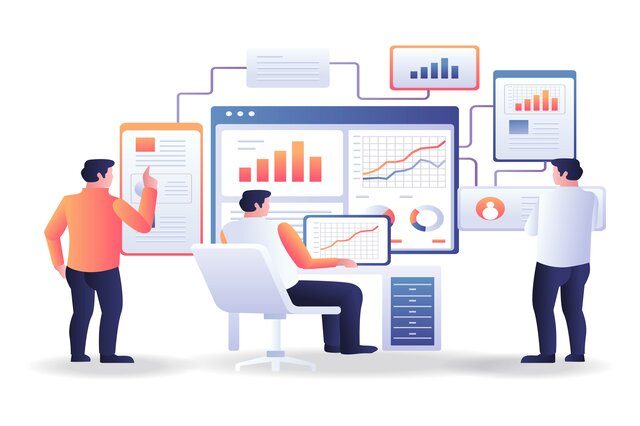In the data-driven symphony of modern business, three figures rise above the orchestra pit, wielding powerful tools and captivating melodies: the Data Scientist, the Data Analyst, and the Data Engineer. Yet, their roles, distinct as their instruments, are often shrouded in confusion, their identities blurred by overlapping notes and interchangeable terms. It is essential to understand the distinctions between these roles to make informed career choices and build successful data-driven teams.
Have you ever wondered why these data deities seem to swap places in job descriptions? This blog will help you to untangle the confusing chords and reveal the unique harmonies each brings to the data-driven concerto.

Data Scientist vs Data Analyst vs Data Engineer: The actual difference
| Feature | Data Scientist | Data Analyst | Data Engineer |
|---|---|---|---|
| Primary Focus | Uncover insights and patterns from data to inform business decisions | Analyze and interpret data to answer specific questions | Develop and maintain data infrastructure and pipelines |
| Skills | Machine learning, statistics, mathematics, programming (Python, R), data visualization, communication | Data analysis, statistics, SQL, data visualization, communication, business acumen | Programming (Python, SQL, Java), cloud platforms, data warehousing, API development, data pipelines |
| Tools and Techniques | Machine learning algorithms, statistical models, data mining tools, visualization dashboards, reporting software | SQL queries, data analysis tools (Excel, Tableau), reporting software, business intelligence tools | Cloud platforms, data pipelines, ETL tools, database management systems, API integration tools |
| Typical Tasks | Build predictive models, identify trends and patterns, recommend business strategies | Generate reports, create dashboards, answer business questions, perform data cleaning | Design and build data pipelines, manage data warehouses, develop APIs, ensure data quality |
Which role is right for you?
Are you the analytical whiz who craves insights and reveals hidden trends? Dive into data science, crafting stories in numbers. Drawn to building the data pipelines that fuel insights? Data engineering’s your jam, wrangling data into manageable, powerful flows. Or do you love translating data into business action? Data analysts bridge the gap, making data sing for stakeholders. Choose your path – the data world needs your unique skills to unlock its boundless potential!
Wrapping Up
Data Scientist, Data Analyst, or Data Engineer – which one are you? While we’ve explored the distinct skills and responsibilities of each role, remember they’re not isolated islands in the data landscape. They’re intricately connected, forming a powerful ecosystem that extracts value from information.
Data scientists, data analysts, and data engineers are integral roles in the world of data and analytics. While each role has its unique focus, skill sets, and responsibilities, they collaboratively contribute to the success of data-driven organizations. By understanding the differences between these roles and aligning skills and interests, individuals can make informed career choices, while organizations can build effective and well-rounded data teams. As technology evolves and new challenges arise, the demand for skilled professionals in these roles will continue to grow, making data science, data analysis, and data engineering promising fields for future career growth and development.
FAQ’s
1. What do data engineers, data scientists, and data analysts do?
Data engineers build and maintain the infrastructure that enables data processing.
Data scientists use advanced statistical techniques and machine learning algorithms to extract insights from data.
Data analysts interpret and visualize data to provide insights for decision-making.
While these roles may have distinct responsibilities, they often collaborate closely to leverage the full potential of data. A successful data team will have a well-balanced mix of skills from these roles to ensure efficient and effective use of data within an organization.
2. What languages do data engineers, data scientists, and data analysts use?
1. Python: Python is one of the most popular programming languages among data professionals. It offers a wide range of libraries and frameworks, such as Pandas, NumPy, and Scikit-learn, which are widely used for data manipulation, analysis, and machine learning tasks.
2. SQL: SQL (Structured Query Language) is a programming language specifically designed for managing and manipulating relational databases. Data engineers often use SQL to extract, transform, and load (ETL) data from various sources into databases.
3. R: R is another widely used language in the field of data analysis and statistics. It provides a comprehensive set of tools for statistical modeling, data visualization, and machine learning.
3. Do Data Engineers Code?
Yes, data engineers do code. In fact, coding is an essential skill for data engineers. Data engineers are responsible for designing, building, and maintaining the infrastructure that enables data collection, storage, and processing. They work closely with data scientists, analysts, and other stakeholders to ensure that data is accessible, reliable, and secure.



